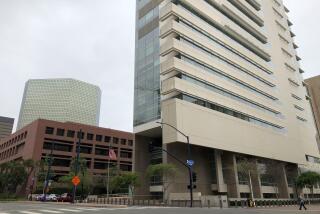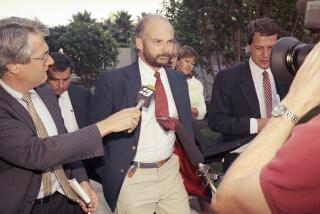Judge Refuses to Dismiss Oil Spill Charges
- Share via
ANCHORAGE — A judge on Tuesday refused to dismiss criminal charges against the skipper of the Exxon Valdez, rejecting arguments that Joseph Hazelwood gained immunity from prosecution by reporting the spill.
Superior Court Judge Karl Johnstone said the nation’s worst oil spill would have been discovered within minutes even if Hazelwood had not radioed in after the tanker hit a reef and began spilling nearly 11 million gallons of crude.
The judge thus ruled that all evidence gathered in the investigation, except for Hazelwood’s actual report, will be admissible at his trial Jan. 22.
Hazelwood is charged with three felonies and three misdemeanors in the March 24 accident, including operating the tanker while under the influence of alcohol.
He could receive up to 10 years in prison and $100,000 in fines if convicted of the felony offenses.
Hazelwood’s lawyers had argued that the seaman was immune from prosecution because state and federal laws protect people who report oil spills.
But after listening to two weeks of testimony, Johnstone concluded that if Hazelwood had not reported the grounding and the spill, it would have delayed the Coast Guard’s discovery of the spill by only 17 minutes.
Johnstone’s ruling appeared to be almost a total victory for prosecutors, who argued that the intent of the spill-reporting immunity provisions was not to protect spillers for incidents that would have been discovered anyway.
Richard Friedman, one of Hazelwood’s lawyers, argued that contract murderers, drug dealers and embezzlers are given immunity because prosecutors believe making their information public will do more good than putting them in jail.
“Congress conferred immunity,” he said. “It’s not in this court’s province to tinker with the statute, to carve out an exception.”
Johnstone based his ruling on testimony by a radar operator at the Coast Guard’s traffic monitoring center in Valdez.
The operator, Bruce Blandford, said that by 12:15 a.m. on March 24 he already was wondering about the location of the tanker. He said if he had not heard from the 987-foot vessel by 12:30, he would have tried to contact it by radio.
Had that failed, he said, at 12:45 he would have tried to determine the tanker’s whereabouts by radar. Hazelwood reported the accident at 12:28.
Blandford said once he heard from Hazelwood, he adjusted his radar and spotted the Exxon Valdez on Bligh Reef.
The location alone would have been enough to require that the port commander be notified, Blandford said, because he would have to assume “that he’s in big, a lot of trouble, because I know that there’s no water there.”
More to Read
Sign up for Essential California
The most important California stories and recommendations in your inbox every morning.
You may occasionally receive promotional content from the Los Angeles Times.













